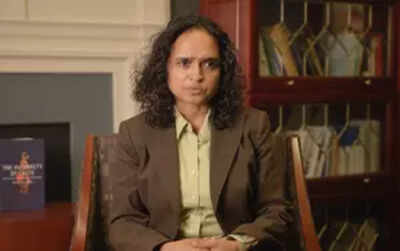
Indian-American professor, Shailaja Paik, conducting research on and writing about Dalit women has received a $800,000 "genius" grant from the MacArthur Foundation
An Indian-American professor has recently grabbed the headlines for her remarkable accomplishment.
Shailaja Paik
, a distinguished Research Professor of History at the University of Cincinnati, has been recognized as one of the 10 MacArthur Fellows from Ohio. Notably, she is the first recipient of this prestigious award from both the city of Cincinnati and the University of Cincinnati since the fellowship's inception in 1981.
Paik's area of research focusses on the experiences of Dalit women, shedding light on their challenges and resilience.
This has earned her an $800,000 "genius" grant (MacArthur grant), underscoring her impact on the field. Rising from a challenging background, Paik has broken through barriers and established her place on the global map, inspiring many with her dedication and passion.
Paik’s Research Work: A Bird’s Eye View
Paik, in her study, sheds light on the historical context of caste domination and its impact on Dalit women, exploring how gender and sexuality undermine their dignity. Her research incorporates a diverse range of sources in English, Marathi, and Hindi, alongside interviews with contemporary Dalit women. In her first book, Dalit Women’s Education in Modern India: Double Discrimination (2014), Paik highlights the challenges Dalit women face in accessing education in colonial and modern Maharashtra, revealing the tension between anti-caste reformers advocating for education and a society constrained by patriarchal Brahminical ideals.
In her latest work, The Vulgarity of Caste: Dalits, Sexuality, and Humanity in Modern India(2022), Paik examines the lives of Dalit performers in Tamasha, a traditional folk theater form. Despite its cultural significance, Tamasha is often perceived as sexualized labor, branding its artists as ashlil, or vulgar. Paik critiques Dr. B. R. Ambedkar’s perspective that places the responsibility of self-upliftment on Dalit women, despite the challenges this creates. Through her analysis of Marathi historical documents and oral histories, she illustrates how Dalit Tamasha women navigate these societal constraints, leveraging performance for economic independence and asserting their humanity against the backdrop of enduring caste discrimination.
A Peek Into Shailja Paik’s Early Life
Born into a Dalit family in Pohegaon, Maharashtra, Paik was one of four daughters. Her family later relocated to Pune, where she was raised in a single-room home in the Yerawada slum. Despite their modest circumstances, Paik’s parents, particularly her father, were firm advocates of education, instilling in their daughters the importance of academic achievement and resilience in the face of societal challenges.
Paik’s Educational Journey and Career Trajectory
Paik earned her BA in 1994 and MA in 1996 from Savitribai Phule Pune University and completed her PhD in 2007 at the University of Warwick. In 2005, she first traveled to the U.S. on a fellowship from Emory University.
She has held academic positions as a visiting assistant professor of history at Union College (2008–2010) and as a postdoctoral associate and visiting assistant professor of South Asian history at Yale University (2012–2013). Since 2010, Paik has been a faculty member at the University of Cincinnati. She is currently serving as the Charles Phelps Taft Distinguished Research Professor of History and an affiliate in Women's, Gender, and Sexuality Studies, Asian Studies, and Sociology at the University of Cincinnati.
What is a MacArthur Foundation Grant?
John D. and Catherine T. MacArthur Foundation is a private organization that offers grants and impact investments to support non-profit entities across roughly 117 countries worldwide. With an endowment of $7.6 billion, it allocates around $260 million each year in grants and investments. Headquartered in Chicago, it ranked as the 12th-largest private foundation in the United States in 2014. Since launching its first grants in 1978, the foundation has distributed over $8.27 billion. The foundation annually honours individuals with remarkable achievements or exceptional potential through these prestigious awards.

 6 months ago
203
6 months ago
203




























 English (US)
English (US)